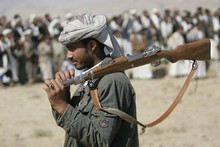 Predictably, insurgency in Iraq has intensified as the March elections near; its scale and frequency was not predicted. Alastair Campbell beamed as a benevolent Uncle when talking about Iraq on Tuesday but Coalition diplomats fear for the democracy’s future. British ambassador to Baghdad, John Jenkins, told the Chilcot inquiry:
Predictably, insurgency in Iraq has intensified as the March elections near; its scale and frequency was not predicted. Alastair Campbell beamed as a benevolent Uncle when talking about Iraq on Tuesday but Coalition diplomats fear for the democracy’s future. British ambassador to Baghdad, John Jenkins, told the Chilcot inquiry:
“Iraq faces a real possibility of a military coup…Although I think where we are at the moment is much better than where we thought it was going be back in 2004-05 you only need look at the history of Iraq to understand that a realistic threat still exists.”
Ayad Jamal Aldin, a Shia cleric who leads the anti-corruption, anti-Iranian and pro-secular Ahrar party, is more stoical:
“If you look at the previous military coups within the country there was unity and loyal support between the senior officers, sub-commanders and soldiers. They were fighting a common cause which they all believed in. In 1958, when the Hashimite monarchy were overthrown, Major-General Abdul Karim el Qasim only had to give the order and every Iraqi soldier followed him. The modern Iraqi security forces are now so divided in their backgrounds, views and religious faiths that the likelihood of a full military coup is almost impossible.”
Divided security forces may be incapable of launching coups, but their cohesion and ability to preserve order are limited by their innate sectarian interests; they may even exacerbate crises. There is a clear connection with Afghanistan, where the future rests with Afghan security forces. When addressing the subject, politicians talk exclusively in terms of numbers and ignore practicalities. They are mistaken to do so: when it comes to state building and policing, numbers are subservient to loyalty and cohesion.






Comments